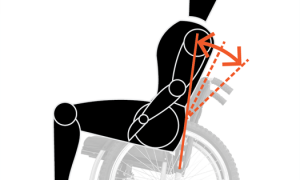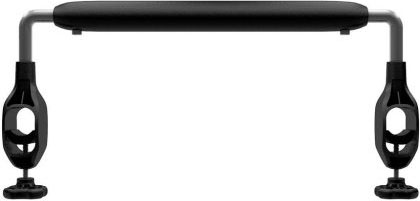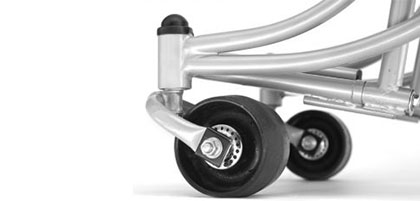$1,695.00
The aluminum lightweight Aurora wheelchair has the same geometry as the award-winning RoughRider, but is 10 pounds lighter. It handles rugged terrain with ease. Provides outstanding durability, stability, and safety from tipping. Floats over soft surfaces and absorbs shocks for a smooth ride. Use it as a daily-use chair or as a backup when life calls for off-pavement adventures.
U.S., Canada, Europe, Australia and New Zealand Only.
For large volume orders and developing world discounts,
please contact us here.
Please carefully read through our Warranty and note our limited return policy.
Back Rest Adjustable: 15″ (381), 17″ (432), 19″ (483), 21″ (533)
Long Wheelbase: Provides outstanding stability and safety from tipping – the number one cause of injury to wheelchair riders
WideFlex Casters: Float over soft surfaces like grass and mud and absorb shocks for a smooth ride
Tight Turning: Radius Useable in spaces as tight as less stable chairs
Large Rear Mountain Bike-Type Tires: Perfect for off road adventures and affordable to replace
Super Duty Tough: Double the industry standard durability performance tests
Multi Position Rear Axle: Allows for center of gravity adjustment for optimal balance
Easy Transport: Simple X-Brace folding design
Bucket Seat: Seat dump designed keep the rider safe chair sudden stops
Machine Washable Upholstery
Easily Available Parts: – Tires, tubes, hardware and bearings are easy to find locally
Sporty Wheel Camber: -3 degrees of wheel camber gives ergonomic push rim placement and lateral stability
Push Button Quick Release Wheels: – Now standard
Anti-Tippers – Now standard
Note: Pressure relief cushion is now included.
Effective Seat Widths: ** 14 (356), 15.5 (393), 17 (432), 18.5 (470)
Seat Depth: *** 14 (356), 16 (406), 18 (457)
Seat Height: **** 18.75 (476)
Seat Angle: 12 degrees
Seat to Back Angle: 90 degrees
Back Height: 15 (381), 17 (432), 19 (483), 21 (533)
Footrest Height from Front of Seat: 10 to 14.75 (254 to 375)
Rear Wheel Dimensions: 24 x 1.75 (70 x 45)
Rear Wheel Camber: 3 degrees
Rear Wheel & Caster Barrel Bearings: 6201 (12mm ID x 32mm OD)
Axles: 12 mm
Push Rim Diameter: 19 (483)
Front Wheel Dimensions: 4.3 in. diameter x 3.1 in. width
Front Wheel Bearings: Standard bicycle hub and bearing
Overall Width: 9 in. (22.9) + Seat width
Overall Length: Shortest 36 (914); longest 39 (990)
Wheelbase (Front to Rear Axle): Shortest 19 (483); longest 22 (559)
Rear Wheel Position Adjustment: 3 positions
Weight (without rear wheels): ***** 23 lb (10.4 kg)
Weight (with rear wheels): ***** 33 lb (14 kg)
* Units in inches and millimeters unless specified. Dimensions are based on a new wheelchair, using an out of the box configuration and components.
** Seat width is defined as the distance between the insides of the Side Frames when the chair is opened fully.
*** 18-inch seat depth is available by installing the seat tube extenders.
**** Measured to the front of the seat tube using a 14 x 16” chair.
***** Measured using a 14 x 16” chair as supplied to the customer. Weight may change based on configuration. Weight includes footrests and excludes anti-tips and
any cushion.
It is important that your Aurora fit you well. A poorly fit wheelchair can cause pressure sores and fall-related injuries. A well fit wheelchair promotes safety, health, and provides the most independence through mobility. Take a moment to carefully measure yourself for your Aurora. With the help of your Occupational Therapist or other health care professional, determine the Seat Width, Seat Depth, Backrest Height, and Back Rest Angle of your Aurora before ordering.
To find the distance between your hips, first position yourself seated with pelvis upright on a firm surface. Then, measure the distance between the widest points of the hips and thighs without compressing any tissue. Finally, record your measurements. It is important not to have a chair that is wider than necessary as it will be harder to push and may prevent you from passing through narrow doorways.
Position yourself seated upright on a firm surface. Measure the length of your upper leg, the distance from behind the knee to the back of the pelvis (back of your lower leg). Subtract 1/2” to find the maximum seat depth, to allow for space between the back of the knee/upper leg and seat fabric. Record the final measurement.
Your preferred backrest height is determined by your personal comfort level and physical ability. We recommend, generally, that the top of the back support should fall just beneath the bottom of the shoulder blade. For less active riders who require more torso support, the back support should be higher, falling just beneath the armpit. Position yourself seated upright on a firm surface. Hold your hands flat against the surface you are sitting on. Measure the distance from the seated surface to the desired, most comfortable point for support on your back. To this number add the height of your cushion when you are sitting on it. Record the measurement.
Backrest angles are determined by the rider’s degree of torso control. RoughRider America recommends that those with less torso control, such as quadriplegics, sit with a backrest angled further backwards to avoid falling forward in a wheelchair. Those with more torso control, such as amputees, can sit with the backrest more upright. Proper backrest angle is best determined by an occupational therapist or health care professional. However, you can adjust the backrest angle by adjusting the backrest straps (i.e. looser at the bottom and tighter at the top for a more erect position). 
The aluminum lightweight Aurora wheelchair has the same geometry as the award-winning RoughRider that was designed by third world wheelchair pioneer, Ralf Hotchkiss, to handle rugged terrain with ease. It has been proven in over 60 countries by more than 100,000 riders who live in the worst of conditions and need the best of chairs. Riders use it as a super-durable daily-use chair or as a backup when life calls for off-pavement adventures.
We believe in affordable technology that frees people to live life to the fullest – even in rugged environments.
The Aurora, like the RoughRider, is our answer to expensive fragile chairs that unnecessarily limit access. Priced at less than half of other lightweight outdoor wheelchairs, the Aurora is by far the best-value lightweight rugged wheelchair.
Now available in the USA and for shipment to Canada, Europe, and Australia. Please note that significant volume discounts are available for donations in developing countries.
| Weight | 51 lbs |
|---|---|
| Dimensions | 37 × 13 × 27 in |
| Seat Width | 14", 15.5", 17", 18.5" |
| Seat Depth | 14" – 16", 16" – 18" |
| Back Rest Height Adjustable | 15”, 17”, 19”, 21" |



To find the distance between your hips, first position yourself seated with pelvis upright on a firm surface. Then, measure the distance between the widest points of the hips and thighs without compressing any tissue. Finally, record your measurements. It is important not to have a chair that is wider than necessary as it will be harder to push and may prevent you from passing through narrow doorways.
Position yourself seated upright on a firm surface. Measure the length of your upper leg, the distance from behind the knee to the back of the pelvis (back of your lower leg). Subtract 1/2” to find the maximum seat depth, to allow for space between the back of the knee/upper leg and seat fabric. Record the final measurement.
Your preferred backrest height is determined by your personal comfort level and physical ability. Whirlwind recommends, generally, that the top of the back support should fall just beneath the bottom of the shoulder blade. For less active riders who require more torso support, the back support should be higher, falling just beneath the armpit. Position yourself seated upright on a firm surface. Hold your hands flat against the surface you are sitting on. Measure the distance from the seated surface to the desired, most comfortable point for support on your back. To this number add the height of your cushion when you are sitting on it. Record the measurement.
Backrest angles are determined by the torso control of the rider. Whirlwind recommends that those with less torso control, such as quadriplegics, sit with a backrest angled further backwards to avoid falling forward in a wheelchair. Those with more torso control, such as amputees, can sit with the backrest more upright. Proper backrest angle is best determined by an occupational therapist or healthcare professional. Although there is only one option – 8 degrees – in the drop-down list below, you can adjust the backrest angle by adjusting the backrest straps (i.e. looser at the bottom and tighter at the top for a more erect position).
Now please enter your measurements into the fields on the product page before ordering. For more information about measuring, please refer to the RoughRider Fitting Sheet. You are responsible for choosing the right chair for yourself. If you are uncomfortable with determining your wheelchair size, please consult a professional.